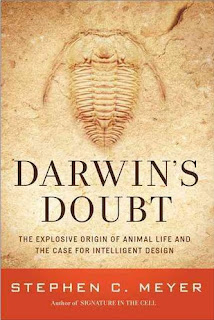
In spite of what they promised earlier, the
Evolution News & Views (sic) blog does not allow comments. That's why I'm posting a quotation from today's piece by David Klinghoffer:
What Drives Darwinian Scientists to their Fury
You may have wondered why Darwinists in academia get so worked up about intelligent design. Reading what they write about our scientists and their work, you picture these guys turning red and sweating a lot. Alternatively, they try to mask their rage by getting all sarcastic and pseudo-witty -- a man of mature age like Larry Moran, for example, calling other adults "IDiots."
I get "worked up" about Intelligent Design Creationism because it's anti-science and one of my issues is the promotion of scientific literacy (and rationalism). It's wrong to describe my feelings as "rage." My feelings about Intelligent Design Creationists are more akin to my feelings about people who believe they were abducted by aliens, or people who believe in bigfoot. "Bemused," "flabbergasted," and "sad" are more appropriate terms to describe how I react when I read the name "David Klinghoffer."
I'm very picky about who I call an IDiot. It's restricted to that subset of adults (and those who wish they were adults) who believe in Intelligent Design Creationism. It's a useful term, just as the terms "Darwinist" and "pompous professor" seem to be useful to David Klinghoffer [see
hypocrisy].
A guy like Professor Pompous or any of the better known Darwinian-scientist writers you can think of aren't driven to their fury directly by the scholarly work of Michael Behe, Doug Axe or Stephen Meyer, but rather indirectly every time a student brings it up in class. Every year a new cohort of young people comes through the lecture hall and some number of them -- probably a growing number -- have been exposed somewhere to ID's critique and alternative to neo-Darwinism. Every time a student puts her hand up and politely asks something along the lines of, "But what about irreducible complexity?" it throws the class discussion down a totally different corridor of the mind than the professor meant it to go.
I hate to be the bearer of bad news, David, but the vast majority of students in my classes have never heard of Intelligent Design Creationism. In my Fall course we discuss Jonathan Wells' book
Icons of Evolution as an example of anti-science writing but I have to explain to the class what Intelligent Design Creationism is all about. It never comes up in other classes.

In my own writings on the subject, I concentrate mostly on what the minor IDiots are writing on their blogs and on what the bigger names are saying in their books. That's why I've been spending so much time lately discussing Jonathan Wells' new book
The Myth of Junk DNA. I've also written about Michael Behe, Stephan Meyer, and Doug Axe.
So, David, you are dead wrong about almost everything you write if it refers to me. I suspect it doesn't apply to most other professors who oppose the IDiots. We're not troubled—and certainly not "enraged"—by what students are saying. We prefer to make fun of the "big guns" but even those targets aren't much of an intellectual challenge.
Instead of constantly acting like a crybaby over perceived insults to your intelligence, why don't you try responding to the rational, scientific arguments we're making? You might learn something.
You can buy the T-shirt at Endangered Outlaw.
 Charles Darwin died on April 19, 1882 and he was buried in Westminster Abbey on Wednesday, April 26, 1882.
Charles Darwin died on April 19, 1882 and he was buried in Westminster Abbey on Wednesday, April 26, 1882. Stephen Meyer, who thinks that 2oth1 century biochemistry and molecular biology disprove evolution.
Stephen Meyer, who thinks that 2oth1 century biochemistry and molecular biology disprove evolution. 











